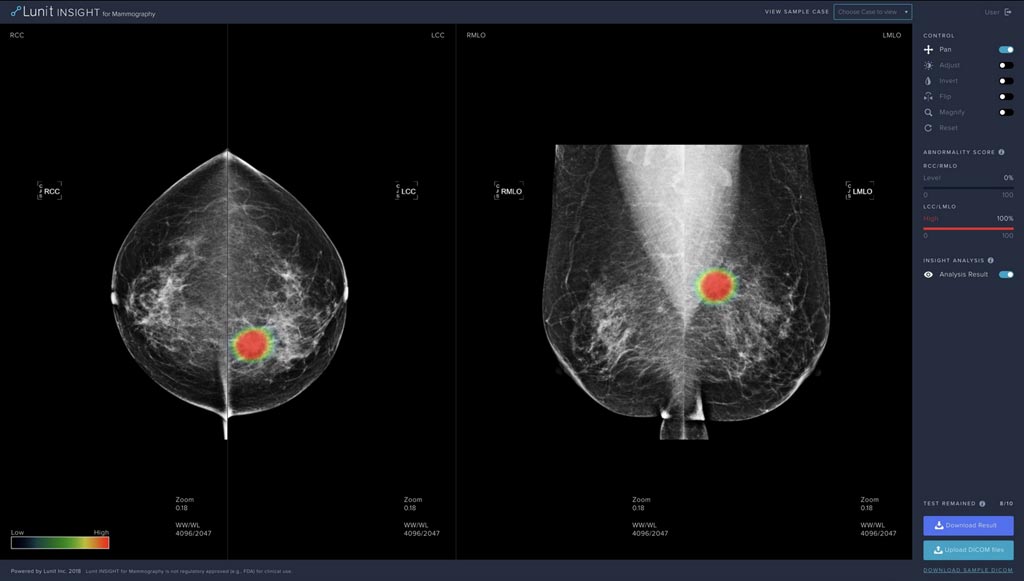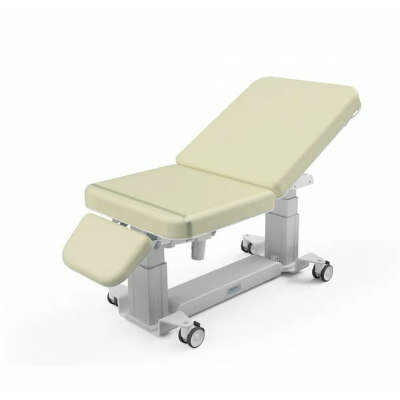Lunit Unveils AI-Based Mammography Solution at RSNA 2018
|
By MedImaging International staff writers Posted on 26 Nov 2018 |

Image: The Lunit INSIGHT for Mammography is expected to increase the cancer detection rate of radiologists by 10% when used as a second reader (Photo courtesy of Lunit).
Lunit (Seoul, South Korea), a medical artificial intelligence (AI) software company, showcased its newest AI solution for breast cancer—Lunit INSIGHT for Mammography— at this year's gathering of Radiological Society North America (RSNA), which was held on November 25-30 at McCormick Place in Chicago, Ill., USA.
Lunit, abbreviated from "learning unit," is focused on developing advanced medical image analytics and data-driven imaging biomarkers via cutting-edge deep learning technology. The company’s mission is to empower physicians with clinically actionable insights that foster accurate and cost-efficient diagnosis and treatment through unprecedented AI-powered imaging biomarkers with cutting-edge, world-leading accuracy.
Lunit's newest AI software, Lunit INSIGHT for Mammography delivers an accuracy of 97% in detecting malignant lesions, which is expected to increase the cancer detection rate of radiologists by 10% when used as a second reader. The company also claims that its AI solution can enable general radiologists to perform at a specialist level, providing solutions to health facilities that experience strains with lack of specialists. It also aims to decrease recall rate and as a result, save medical costs that are being wasted every year.
At RSNA 2018, the company also showcased Lunit INSIGHT for Chest Radiography, which has been tested in more than 1.5 million cases from more than 70 countries since being launched during last year's RSNA. With an accuracy level of 97-99%, it detects major chest abnormalities including nodules, consolidation, pneumothorax, etc. The CAD-based solution is also being integrated into the worklist for prioritization, in which positive cases may be read first in order to decrease turnaround time and increase overall reading productivity.
Lunit's proprietary AI technology has been trained with vast quality medical data to ensure high accuracy levels. The company’s AI has been trained with over 200,000 chest X-ray cases and 200,000 mammogram cases, out of which 50,000 cases were biopsy-proven malignant cases.
Lunit also presented six abstracts during RSNA 2018, consisting mainly of its latest findings and studies based on its AI technology in medical imaging such as mammography and chest radiography. Lunit’s new CEO Brandon Suh was on stage at Machine Learning Theater to give a presentation titled, “From AI-powered Diagnostic Support Tools to Imaging Biomarkers: Aiming Beyond Human-Level Accuracy,” which provided an overview of the company’s recent achievements and future developments.
Related Links:
Lunit
Lunit, abbreviated from "learning unit," is focused on developing advanced medical image analytics and data-driven imaging biomarkers via cutting-edge deep learning technology. The company’s mission is to empower physicians with clinically actionable insights that foster accurate and cost-efficient diagnosis and treatment through unprecedented AI-powered imaging biomarkers with cutting-edge, world-leading accuracy.
Lunit's newest AI software, Lunit INSIGHT for Mammography delivers an accuracy of 97% in detecting malignant lesions, which is expected to increase the cancer detection rate of radiologists by 10% when used as a second reader. The company also claims that its AI solution can enable general radiologists to perform at a specialist level, providing solutions to health facilities that experience strains with lack of specialists. It also aims to decrease recall rate and as a result, save medical costs that are being wasted every year.
At RSNA 2018, the company also showcased Lunit INSIGHT for Chest Radiography, which has been tested in more than 1.5 million cases from more than 70 countries since being launched during last year's RSNA. With an accuracy level of 97-99%, it detects major chest abnormalities including nodules, consolidation, pneumothorax, etc. The CAD-based solution is also being integrated into the worklist for prioritization, in which positive cases may be read first in order to decrease turnaround time and increase overall reading productivity.
Lunit's proprietary AI technology has been trained with vast quality medical data to ensure high accuracy levels. The company’s AI has been trained with over 200,000 chest X-ray cases and 200,000 mammogram cases, out of which 50,000 cases were biopsy-proven malignant cases.
Lunit also presented six abstracts during RSNA 2018, consisting mainly of its latest findings and studies based on its AI technology in medical imaging such as mammography and chest radiography. Lunit’s new CEO Brandon Suh was on stage at Machine Learning Theater to give a presentation titled, “From AI-powered Diagnostic Support Tools to Imaging Biomarkers: Aiming Beyond Human-Level Accuracy,” which provided an overview of the company’s recent achievements and future developments.
Related Links:
Lunit
Latest RSNA 2018 News
- New AI-Powered Lung Imaging Solution Launched at RSNA 2018
- Agfa Brings Intelligent Radiography to RSNA 2018
- Carestream Displays Several IT Offerings at Radiology Congress
- Double Black Imaging Announces Expanded Clinical LCD Line at Trade Show
- Guerbet Showcases Ongoing Collaboration with IBM Watson at Radiology Trade Fair
- Fujifilm Showcases New DR Detectors and AI Initiative in Chicago
- M*Modal Launches Cloud-Based Version of AI-Powered Reporting Solution
- MDW Unveils First Radiology Blockchain Platform at RSNA 2018
- Teledyne DALSA Displays Xineos Family of CMOS X-ray Detectors
- SuperSonic Imagine Showcases New Ultrasound System at RSNA 2018
- CIVCO Medical Solutions Introduces Next-Generation of Ultrasound Accessories
- Subtle Medical Showcases Al for PET and MRI Scans at RSNA 2018
- Philips Launches New Platform to Enable Development of AI Assets
Channels
Radiography
view channel
Novel Breast Imaging System Proves As Effective As Mammography
Breast cancer remains the most frequently diagnosed cancer among women. It is projected that one in eight women will be diagnosed with breast cancer during her lifetime, and one in 42 women who turn 50... Read more
AI Assistance Improves Breast-Cancer Screening by Reducing False Positives
Radiologists typically detect one case of cancer for every 200 mammograms reviewed. However, these evaluations often result in false positives, leading to unnecessary patient recalls for additional testing,... Read moreMRI
view channel
World's First Sensor Detects Errors in MRI Scans Using Laser Light and Gas
MRI scanners are daily tools for doctors and healthcare professionals, providing unparalleled 3D imaging of the brain, vital organs, and soft tissues, far surpassing other imaging technologies in quality.... Read more
Diamond Dust Could Offer New Contrast Agent Option for Future MRI Scans
Gadolinium, a heavy metal used for over three decades as a contrast agent in medical imaging, enhances the clarity of MRI scans by highlighting affected areas. Despite its utility, gadolinium not only... Read more.jpg)
Combining MRI with PSA Testing Improves Clinical Outcomes for Prostate Cancer Patients
Prostate cancer is a leading health concern globally, consistently being one of the most common types of cancer among men and a major cause of cancer-related deaths. In the United States, it is the most... Read moreUltrasound
view channel
Largest Model Trained On Echocardiography Images Assesses Heart Structure and Function
Foundation models represent an exciting frontier in generative artificial intelligence (AI), yet many lack the specialized medical data needed to make them applicable in healthcare settings.... Read more.jpg)
Groundbreaking Technology Enables Precise, Automatic Measurement of Peripheral Blood Vessels
The current standard of care of using angiographic information is often inadequate for accurately assessing vessel size in the estimated 20 million people in the U.S. who suffer from peripheral vascular disease.... Read more
Deep Learning Advances Super-Resolution Ultrasound Imaging
Ultrasound localization microscopy (ULM) is an advanced imaging technique that offers high-resolution visualization of microvascular structures. It employs microbubbles, FDA-approved contrast agents, injected... Read more
Novel Ultrasound-Launched Targeted Nanoparticle Eliminates Biofilm and Bacterial Infection
Biofilms, formed by bacteria aggregating into dense communities for protection against harsh environmental conditions, are a significant contributor to various infectious diseases. Biofilms frequently... Read moreNuclear Medicine
view channel
New Imaging Technique Monitors Inflammation Disorders without Radiation Exposure
Imaging inflammation using traditional radiological techniques presents significant challenges, including radiation exposure, poor image quality, high costs, and invasive procedures. Now, new contrast... Read more
New SPECT/CT Technique Could Change Imaging Practices and Increase Patient Access
The development of lead-212 (212Pb)-PSMA–based targeted alpha therapy (TAT) is garnering significant interest in treating patients with metastatic castration-resistant prostate cancer. The imaging of 212Pb,... Read moreNew Radiotheranostic System Detects and Treats Ovarian Cancer Noninvasively
Ovarian cancer is the most lethal gynecological cancer, with less than a 30% five-year survival rate for those diagnosed in late stages. Despite surgery and platinum-based chemotherapy being the standard... Read more
AI System Automatically and Reliably Detects Cardiac Amyloidosis Using Scintigraphy Imaging
Cardiac amyloidosis, a condition characterized by the buildup of abnormal protein deposits (amyloids) in the heart muscle, severely affects heart function and can lead to heart failure or death without... Read moreGeneral/Advanced Imaging
view channel
PET Scans Reveal Hidden Inflammation in Multiple Sclerosis Patients
A key challenge for clinicians treating patients with multiple sclerosis (MS) is that after a certain amount of time, they continue to worsen even though their MRIs show no change. A new study has now... Read more
Artificial Intelligence Evaluates Cardiovascular Risk from CT Scans
Chest computed tomography (CT) is a common diagnostic tool, with approximately 15 million scans conducted each year in the United States, though many are underutilized or not fully explored.... Read more
New AI Method Captures Uncertainty in Medical Images
In the field of biomedicine, segmentation is the process of annotating pixels from an important structure in medical images, such as organs or cells. Artificial Intelligence (AI) models are utilized to... Read more.jpg)
CT Coronary Angiography Reduces Need for Invasive Tests to Diagnose Coronary Artery Disease
Coronary artery disease (CAD), one of the leading causes of death worldwide, involves the narrowing of coronary arteries due to atherosclerosis, resulting in insufficient blood flow to the heart muscle.... Read moreImaging IT
view channel
New Google Cloud Medical Imaging Suite Makes Imaging Healthcare Data More Accessible
Medical imaging is a critical tool used to diagnose patients, and there are billions of medical images scanned globally each year. Imaging data accounts for about 90% of all healthcare data1 and, until... Read more
Global AI in Medical Diagnostics Market to Be Driven by Demand for Image Recognition in Radiology
The global artificial intelligence (AI) in medical diagnostics market is expanding with early disease detection being one of its key applications and image recognition becoming a compelling consumer proposition... Read moreIndustry News
view channel
Bayer and Google Partner on New AI Product for Radiologists
Medical imaging data comprises around 90% of all healthcare data, and it is a highly complex and rich clinical data modality and serves as a vital tool for diagnosing patients. Each year, billions of medical... Read more



















